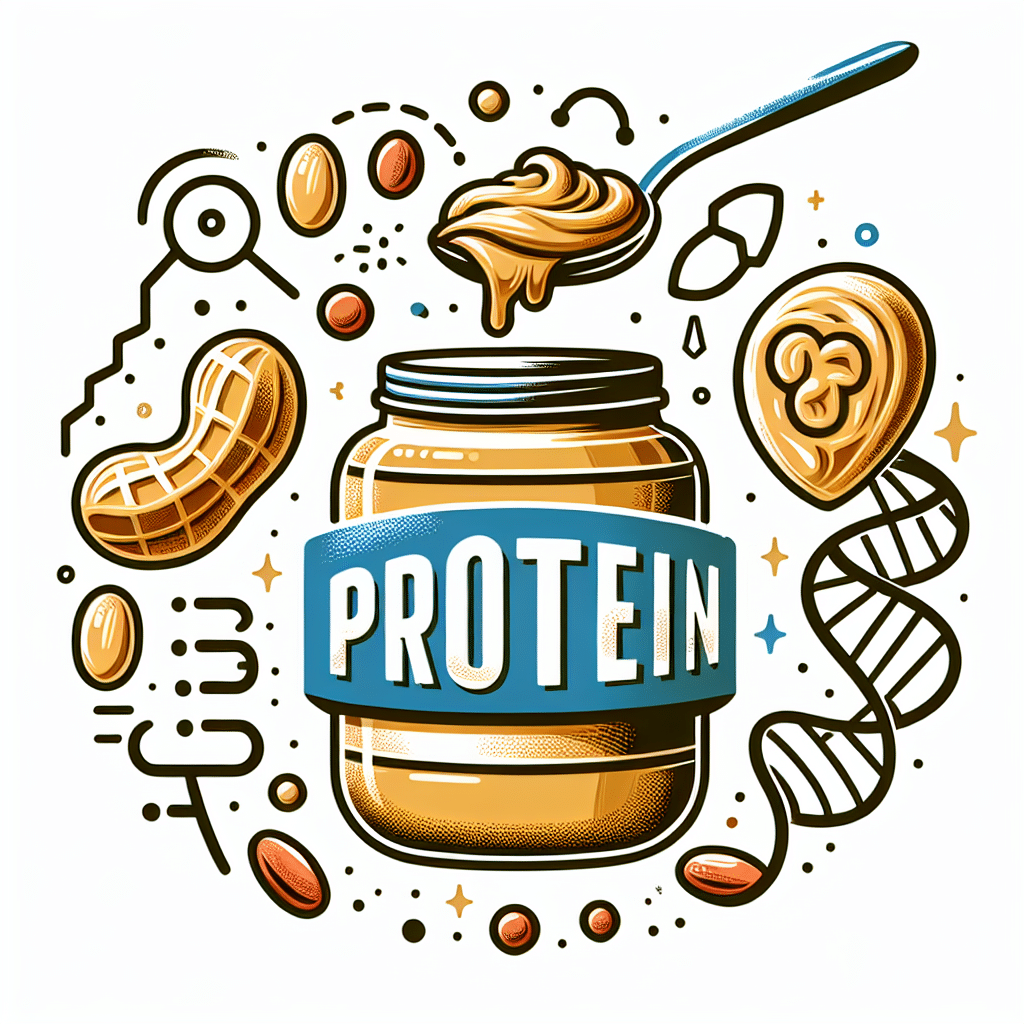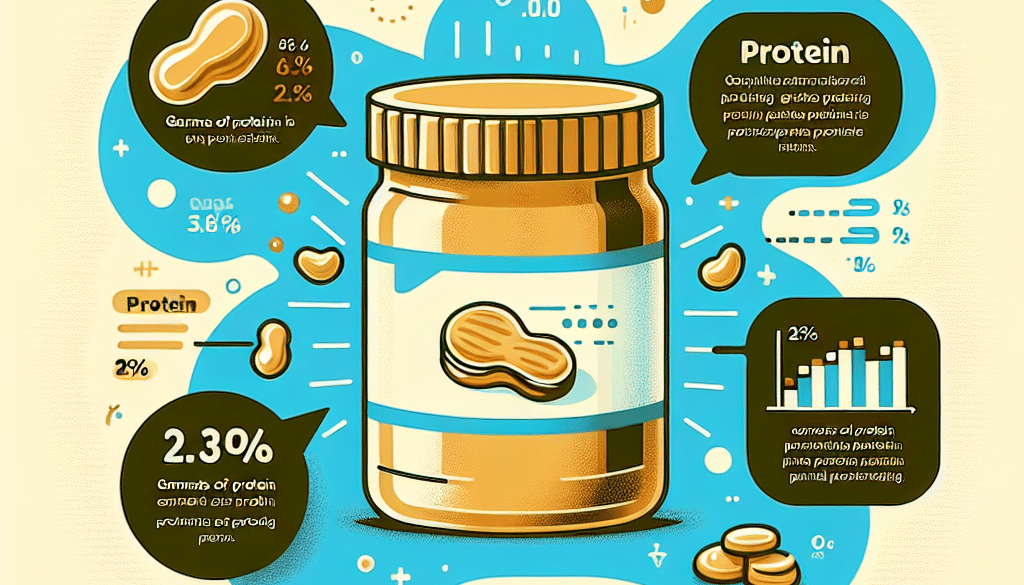Is Peanut Butter Full Of Protein? Discover More
Table of Contents
- Peanut Butter: A Protein-Packed Pantry Staple?
- Understanding the Nutritional Profile of Peanut Butter
- Protein Content in Peanut Butter: The Facts
- Comparing Peanut Butter to Other Protein Sources
- Integrating Peanut Butter into a High-Protein Diet
- Health Considerations and Potential Downsides
- Case Studies and Research on Peanut Butter and Protein
- Conclusion: The Protein Potential of Peanut Butter
- Discover ETprotein’s High-Quality Protein Products
Peanut Butter: A Protein-Packed Pantry Staple?

When it comes to convenient sources of protein, peanut butter is often a go-to choice for many. Its creamy texture and rich flavor make it a favorite spread for snacks and meals alike. But beyond its taste, how does peanut butter fare in terms of protein content? Is it truly a protein powerhouse, or is this a nutty misconception? In this article, we’ll delve into the nutritional profile of peanut butter, explore its protein content, and discuss its role in a balanced diet.
Understanding the Nutritional Profile of Peanut Butter
Peanut butter is more than just a tasty treat; it’s a complex food with a variety of nutritional benefits. Made primarily from ground peanuts, which are technically legumes, peanut butter contains several essential nutrients. Here’s a breakdown of what you can typically find in a serving of peanut butter:
- Protein
- Healthy fats (monounsaturated and polyunsaturated)
- Fiber
- Vitamins and minerals (such as Vitamin E, magnesium, and potassium)
- Antioxidants
However, it’s important to note that not all peanut butters are created equal. The nutritional content can vary depending on the brand and whether it’s a natural or processed product. Processed peanut butters may contain added sugars, oils, and preservatives that can alter the health benefits.
Protein Content in Peanut Butter: The Facts
Protein is a crucial macronutrient necessary for building and repairing tissues, making enzymes and hormones, and supporting overall health. But how much protein does peanut butter actually contain?
On average, two tablespoons of peanut butter provide about 7-8 grams of protein. This amount represents a significant portion of the recommended daily intake, which is 46 grams for women and 56 grams for men, according to the USDA. While peanut butter can contribute to your daily protein needs, it’s not as protein-dense as some other foods like meats, dairy products, or legumes in their whole form.
Comparing Peanut Butter to Other Protein Sources
When evaluating peanut butter as a protein source, it’s helpful to compare it to other common foods:
- Chicken breast (cooked): 31 grams of protein per 100 grams
- Black beans (cooked): 9 grams of protein per 100 grams
- Almonds: 21 grams of protein per 100 grams
- Eggs: 6 grams of protein per large egg
While peanut butter isn’t the most protein-rich option available, it holds its own, especially when considering its convenience and versatility.
Integrating Peanut Butter into a High-Protein Diet
For those looking to increase their protein intake, peanut butter can be a valuable addition to the diet. Here are some creative ways to incorporate it:
- Spread on whole-grain toast or rice cakes
- Blended into protein shakes or smoothies
- Used as a dip for fruits or vegetables
- Mixed into oatmeal or yogurt
- Added to homemade energy bars or protein balls
Remember to be mindful of portion sizes, as peanut butter is calorie-dense due to its high fat content.
Health Considerations and Potential Downsides
While peanut butter offers protein and other nutrients, there are some considerations to keep in mind:
- Calories: Peanut butter is high in calories, which can contribute to weight gain if consumed in excess.
- Added ingredients: Some brands add sugar, hydrogenated oils, and salt, which can detract from its health benefits.
- Allergies: Peanut allergies are common and can be severe. Always be cautious if you or someone you’re serving has a peanut allergy.
Choosing natural, unsweetened peanut butter with no added oils can help mitigate some of these concerns.
Case Studies and Research on Peanut Butter and Protein
Several studies have examined the role of peanut butter in the diet. For instance, research published in the “Journal of Nutrition and Metabolism” suggests that regular consumption of peanuts and peanut butter may contribute to an increased intake of protein, fats, and various micronutrients. Another study in the “British Journal of Nutrition” found that including peanuts and peanut butter in a high-protein diet for weight loss could improve the intake of several nutrients while supporting weight management goals.
Conclusion: The Protein Potential of Peanut Butter
In conclusion, peanut butter is indeed a source of protein, albeit not as concentrated as some other foods. Its convenience, taste, and additional nutritional benefits make it a worthwhile addition to a balanced diet, especially for those looking to boost their protein intake in a plant-based form. However, moderation is key, and choosing natural, minimally processed varieties will maximize health benefits.
Discover ETprotein’s High-Quality Protein Products
If you’re seeking additional protein sources to complement your diet, consider exploring ETprotein’s range of organic and high-purity protein products. Their selection includes various plant-based proteins that cater to different dietary needs and preferences. Whether you’re formulating sports nutrition supplements, developing health and wellness products, or simply looking to enrich your diet with quality protein, ETprotein has options to suit your requirements.
About ETprotein:
ETprotein, a reputable protein and L-(+)-Ergothioneine (EGT) Chinese factory manufacturer and supplier, is renowned for producing, stocking, exporting, and delivering the highest quality organic bulk vegan proteins and L-(+)-Ergothioneine. They include Organic rice protein, clear rice protein, pea protein, clear pea protein, watermelon seed protein, pumpkin seed protein, sunflower seed protein, mung bean protein, peanut protein, and L-(+)-Ergothioneine EGT Pharmaceutical grade, L-(+)-Ergothioneine EGT food grade, L-(+)-Ergothioneine EGT cosmetic grade, L-(+)-Ergothioneine EGT reference grade and L-(+)-Ergothioneine EGT standard. Their offerings, characterized by a neutral taste, non-GMO, allergen-free attributes, with L-(+)-Ergothioneine purity over 98%, 99%, cater to a diverse range of industries. They serve nutraceutical, pharmaceutical, cosmeceutical, veterinary, as well as food and beverage finished product distributors, traders, and manufacturers across Europe, USA, Canada, Australia, Thailand, Japan, Korea, Brazil, and Chile, among others.
ETprotein specialization includes exporting and delivering tailor-made protein powder and finished nutritional supplements. Their extensive product range covers sectors like Food and Beverage, Sports Nutrition, Weight Management, Dietary Supplements, Health and Wellness Products, and Infant Formula, ensuring comprehensive solutions to meet all your protein needs.
As a trusted company by leading global food and beverage brands and Fortune 500 companies, ETprotein reinforces China’s reputation in the global arena. For more information or to sample their products, please contact them and email sales(at)ETprotein.com today.












